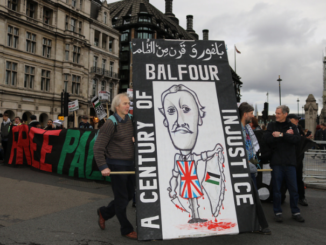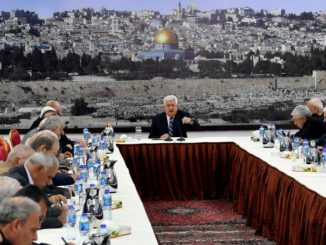
By Ramona Wadi
Two recent news reports about Palestinian Authority leader Mahmoud Abbas and his role in the diplomatic negotiations have conveyed the absence of leadership in reclaiming Palestinian rights.
The White House statement blaming Abbas for wasting decades of negotiations is accurate up to a point, although the context given by the US is misleading.
Meanwhile, a recent poll conducted by the Palestinian Center for Policy and Survey Research reveals 70 per cent of respondents demanding the resignation of Abbas. The poll also shows that 90 per cent view US President Donald Trump’s decision regarding Jerusalem “as a threat to Palestinian interests.”
To focus upon the Palestinian narrative requires an analysis of Abbas’s actions as part of the collaborative system which required the PA leader to waste so many years on talks. Israel and the international community needed such a process and a willing partner in order to buy the Zionist state more time to colonize more land, and to implement a near irreversible deterioration of Palestinian rights and autonomy.
Abbas’s threat to walk away from negotiations is meaningless when we consider the loss of Palestinian territory since the start of Zionist colonization. There is no credibility in viewing the belated decision over Jerusalem in isolation and framing it as the epitome of how to prevent a peace process from succeeding.
“This rhetoric,” claims the US, “which has prevented peace for years, is not surprising as we anticipated reactions like this.” Apart from the fact that this claim by Washington shifts the blame entirely onto the victims of Israel’s military occupation, it reveals Abbas’s predictability in reserving his grand statements for seemingly exceptional moments.
It also shows that Israel, the PA, the US and the international community are complicit in orchestrating the political scenario in a way that normalizes colonial expansion, something that has affected Jerusalem for years before Trump’s statement.
At the same time, they have worked to create a sensationalist hype appended to the symbolism associated with Jerusalem in order to prioritize the political leadership’s rhetoric over the people’s uprising.
Palestinians, as the poll shows, have differentiated between these tactics. The rejection of Abbas as Palestinian leader is one important expression which the political actors prefer to avoid, thus sustaining both opinions on the political spectrum of Abbas having “wasted decades” without the obligation to assert the reasons behind this reality.
As regards the negotiations, Palestinians continue to express not only dissatisfaction but also opposition. There is plenty of awareness about Abbas’s subjugation to US and Israeli interests. While only 49 per cent of respondents in the above-mentioned survey said that Abbas would accept a peace plan put forward by the US, it is important to note the percentage in comparison to the 42 per cent who believe that the PA leader would not accept the initiative.
The absence of national unity, on the other hand, is considered to be a stumbling block to Palestinian autonomy by only 4 per cent of respondents, which is also indicative of the opportunist dynamics mostly exhibited by the PA, particularly with regard to its oppression of the Palestinians in Gaza.
Clearly, Palestinians are demonstrating their political awareness regarding the role of the PA and Abbas in the negotiations. It is time for the international community to support the Palestinian people in their determination to achieve their aspirations for Palestine, as opposed to international impositions and the puppet PA regime.
– Ramona Wadi is a staff writer for Middle East Monitor (MEMO). She contributed this article to PalestineChronicle.com. (This article was originally published in MEMO).








“The absence of national unity, on the other hand, is considered to be a stumbling block to Palestinian autonomy by only 4 per cent of respondents”
What is wrong with all the other Palestinian organizations who are still calling for UNITY with a TRAITOR?